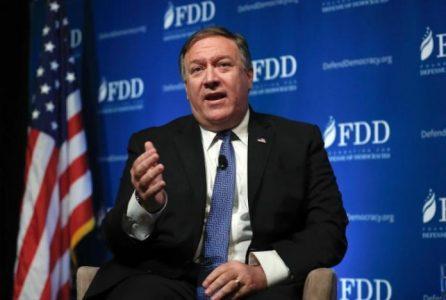
CIA boss says ISIS can attack US even after losing Raqqa
Islamic State terrorists are capable of orchestrating and carrying out an attack against the United States, possibly downing an airplane, even after being evicted from their self-declared Syrian capital of Raqqa, the CIA director said Thursday.
Mike Pompeo said the U.S. is threatened by other militant groups as well.
“ISIS’ capability to conduct an external operation remains,” Pompeo said. “But I wouldn’t put them in a singular bucket. Al-Qaida in the Arabian Peninsula has for a long time had this mission statement, which includes the taking down of a commercial airliner bound for a western country. Certainly, among those would be the United States.”
Speaking a day after President Donald Trump’s acting homeland security chief invoked the possibility of another 9/11-style attack, Pompeo said America’s enemies around the world “are intent upon using commercial aviation as their vector to present a threat to the West.” However, he also worried about a terrorist capability “we just don’t see.”
The typically blunt threat assessment came during a wide-ranging discussion at a Washington think tank, in which Pompeo also underscored President Donald Trump’s intent to counteract North Korea. He said Pyongyang is only months away from perfecting its nuclear weapons capabilities.
“They are closer now than they were five years ago, and I expect they will be closer in five months than they are today, absent a global effort to push back against them,” Pompeo said. “From a U.S. policy perspective, we ought to behave as if we are on the cusp of them achieving that objective.”
On another nuclear concern, Iran, Pompeo stressed that Trump wants to ensure the U.S. foe has no pathway to developing the bomb. To that effect, he said, the Iran nuclear deal President Barack Obama and America’s allies negotiated with Iran was insufficient.
The notion that the agreement would “curtail Iranian adventurism or their terror threat or their malignant behavior has now … two years on, proven to be fundamentally false,” said Pompeo, a former Republican congressman from Kansas who keenly opposed the seven-nation accord when it was reached.
He said the Iran deal put the United States in a better place with respect to inspections of Iranian facilities. But from an intelligence perspective, he said, even more “intrusive inspection” is needed.
“The Iranians have on multiple occasions been capable of presenting a continued threat, through covert efforts to develop their nuclear program along multiple dimensions … the missile dimension, the weaponization effort, the nuclear component itself,” he said.
Trump has provided the CIA with the authority it needs to track Iran’s compliance with the deal, he said.
Pompeo also said it’s an “open secret” that Iran has links to al-Qaida.
“There have been relationships, there are connections. There have been times the Iranians have worked alongside al-Qaida,” Pompeo said. “There have been connections where, at the very least, they have cuts deals so as not to come after each other.”
Pompeo and Trump’s national security adviser, H.R. McMaster, who also spoke at the Foundation for Defense of Democracies event, both said the U.S. must counter Iran’s aggression in the region. They noted Iran’s support for the Lebanon’s Hezbollah militants, who threaten Israel; backing of Shia militias in Iraq and Syria; cyber activities; ballistic missile efforts; and a long history of proliferation ties with North Korea.
Pompeo said Iran’s Revolutionary Guard Corps controls as much as 20 percent of the Iranian economy. McMaster said the United States needs to raise the cloak on the IRGC’s financial network and urge companies worldwide not to do business with it.
“Don’t enrich the IRGC,” McMaster said. “Don’t enable their murderous campaign. Don’t enable their threat to our friends in the region, especially Israel, but also Saudi Arabia and others.”
Source: Israel Hayom





